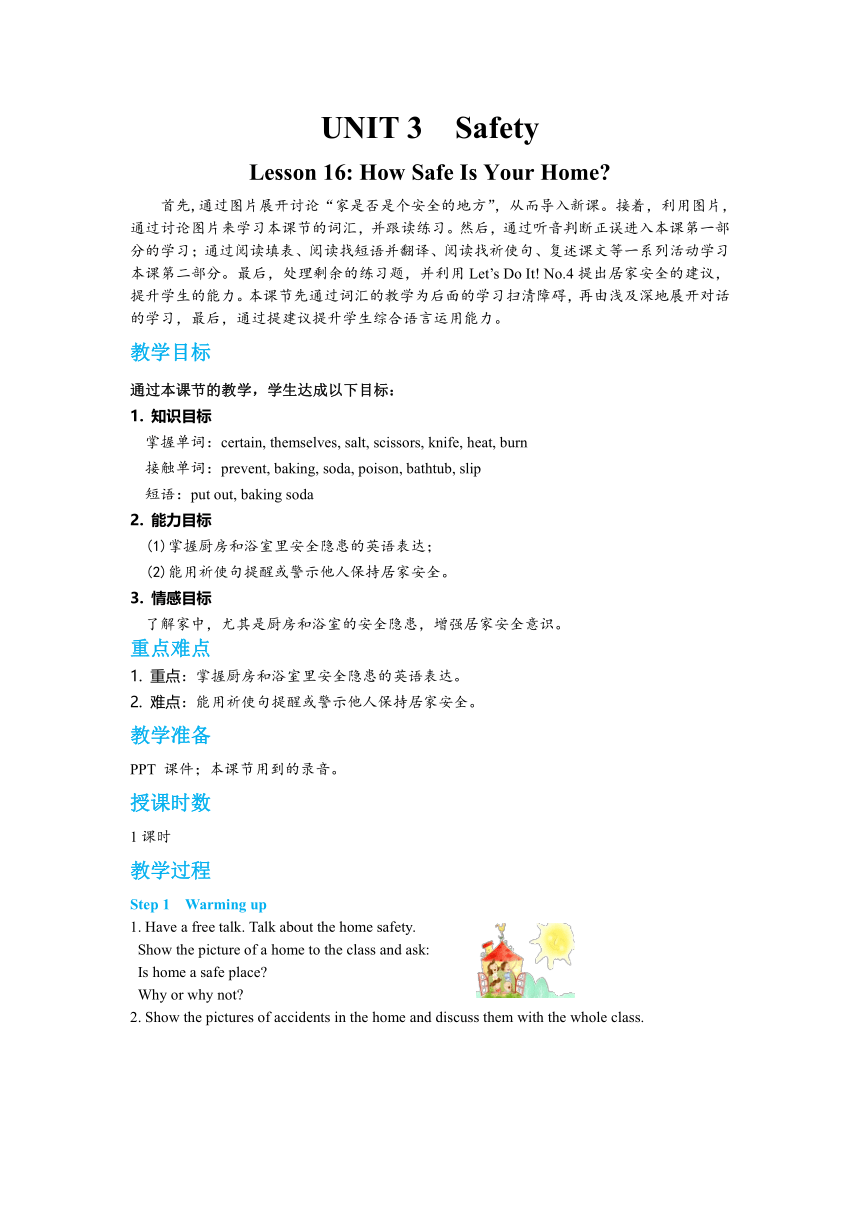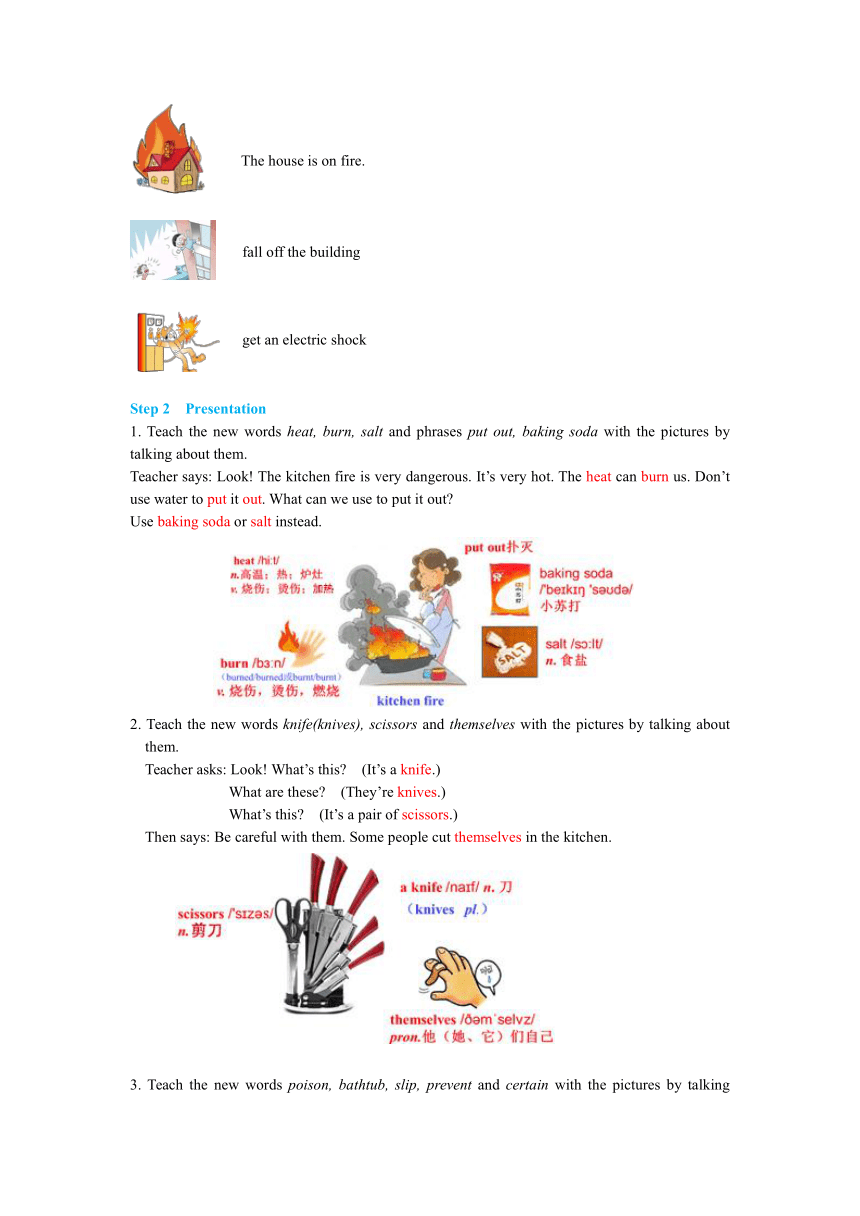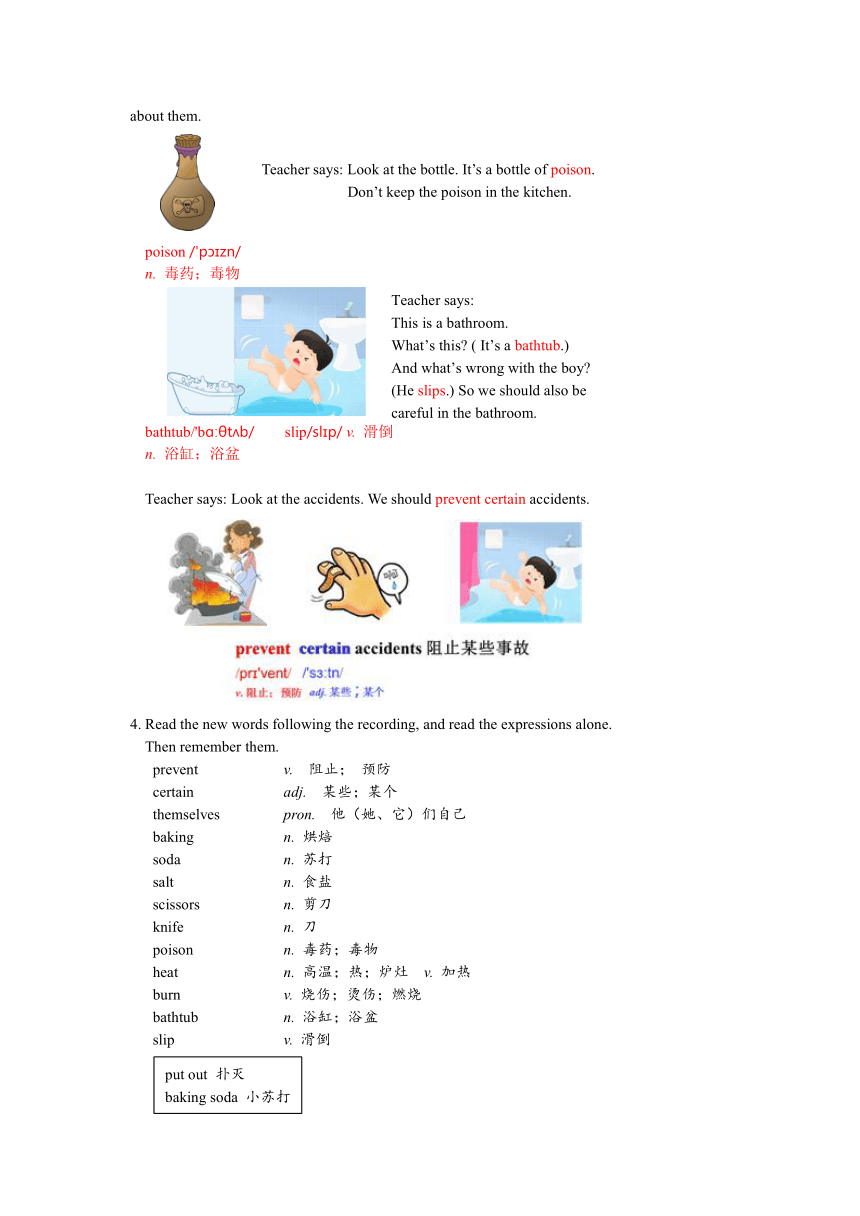Unit 3 Lesson 16 How Safe Is Your Home? 教学设计
文档属性
| 名称 | Unit 3 Lesson 16 How Safe Is Your Home? 教学设计 |

|
|
| 格式 | zip | ||
| 文件大小 | 725.2KB | ||
| 资源类型 | 教案 | ||
| 版本资源 | 冀教版 | ||
| 科目 | 英语 | ||
| 更新时间 | 2022-05-16 21:04:50 | ||
图片预览



文档简介
UNIT 3 Safety
Lesson 16: How Safe Is Your Home
首先,通过图片展开讨论“家是否是个安全的地方”,从而导入新课。接着,利用图片,通过讨论图片来学习本课节的词汇,并跟读练习。然后,通过听音判断正误进入本课第一部分的学习;通过阅读填表、阅读找短语并翻译、阅读找祈使句、复述课文等一系列活动学习本课第二部分。最后,处理剩余的练习题,并利用Let’s Do It! No.4提出居家安全的建议,提升学生的能力。本课节先通过词汇的教学为后面的学习扫清障碍,再由浅及深地展开对话的学习,最后,通过提建议提升学生综合语言运用能力。
教学目标
通过本课节的教学,学生达成以下目标:
1. 知识目标
掌握单词:certain, themselves, salt, scissors, knife, heat, burn
接触单词:prevent, baking, soda, poison, bathtub, slip
短语:put out, baking soda
2. 能力目标
(1)掌握厨房和浴室里安全隐患的英语表达;
(2)能用祈使句提醒或警示他人保持居家安全。
3. 情感目标
了解家中,尤其是厨房和浴室的安全隐患,增强居家安全意识。
重点难点
1. 重点:掌握厨房和浴室里安全隐患的英语表达。
2. 难点:能用祈使句提醒或警示他人保持居家安全。
教学准备
PPT 课件;本课节用到的录音。
授课时数
1课时
教学过程
Step 1 Warming up
1. Have a free talk. Talk about the home safety.
Show the picture of a home to the class and ask:
Is home a safe place
Why or why not
2. Show the pictures of accidents in the home and discuss them with the whole class.
Step 2 Presentation
1. Teach the new words heat, burn, salt and phrases put out, baking soda with the pictures by talking about them.
Teacher says: Look! The kitchen fire is very dangerous. It’s very hot. The heat can burn us. Don’t use water to put it out. What can we use to put it out
Use baking soda or salt instead.
2. Teach the new words knife(knives), scissors and themselves with the pictures by talking about them.
Teacher asks: Look! What’s this (It’s a knife.)
What are these (They’re knives.)
What’s this (It’s a pair of scissors.)
Then says: Be careful with them. Some people cut themselves in the kitchen.
3. Teach the new words poison, bathtub, slip, prevent and certain with the pictures by talking about them.
poison /'p zn/
n. 毒药;毒物
bathtub/'bɑ θt b/ slip/sl p/ v. 滑倒
n. 浴缸;浴盆
Teacher says: Look at the accidents. We should prevent certain accidents.
4. Read the new words following the recording, and read the expressions alone.
Then remember them.
prevent v. 阻止; 预防
certain adj. 某些;某个
themselves pron. 他(她、它)们自己
baking n. 烘焙
soda n. 苏打
salt n. 食盐
scissors n. 剪刀
knife n. 刀
poison n. 毒药;毒物
heat n. 高温;热;炉灶 v. 加热
burn v. 烧伤;烫伤;燃烧
bathtub n. 浴缸;浴盆
slip v. 滑倒
Step 3 Listening and judging
Play the recording of Part 1 of the passage for the class to listen to and tell true (T) or false (F).
1. Sometimes home is not safe enough. ( )
2. Kitchen and living room are the two most dangerous rooms in the house. ( )
3. People can prevent certain accidents. ( )
Answers: 1. T 2. F 3. T
Step 4 Reading
1. Get the class to read Part 2 of the passage and fill in the blanks. (Let’s Do It! No. 1)
Safety tips for preventing accidents in the kitchen
Dos Don’ts
Answers:
Dos: Use baking soda or salt to put out kitchen fires.
Be careful with scissors and knives!
Be careful with fire and heat when you cook.
Don’ts: Don’t stand on chairs.
Don’t use water to put out kitchen fires.
Don’t keep poisons in the kitchen.
Don’t put things which catch fire easily near the stove.
Safety tips for preventing accidents in the bathroom
Dos Don’ts
Answers:
Dos: Be sure to keep the bathroom floor dry after you have a shower or bath.
Don’ts: Never use electricity in the shower or bathtub.
Never leave small children alone in a bathtub.
2. Get the class to read the passage and find the following expressions. And
translate them into Chinese.
safety tips for… ……的安全建议
stand on chairs 站在椅子上
fall off从……掉下来
use…to do sth.用……做某事
put out扑灭
be careful with当心……,小心……
cut oneself 割着某人自己
burn oneself 烧/烫着某人自己
It’s easy to do sth. 做某事很容易
be sure to do sth. 务必做某事
have a shower/bath 洗澡
leave sb. alone+地点 把某人单独留在……
3. Read and sum up
(1) Get the class to Read the passage again and pay attention to the impe-
ratives.
(2) Give the class more examples.
Always show your front to the world.
Be honest rather than clever.
Learn to say before you sing.
Let patience grow in your garden.
Never say die.
Forget about the days when it’s been cloudy.
Forget about the days when you’ve been lonely.
Don’t forget the friendly smiles you’ve seen.
Step 5 Reading and retelling
1. Get the class to read Part 2 of the passage following the recording.
2. Get the students to retell Part 2 according to the clues.
Step 6 Exercises
1. Fill in the blanks with the correct forms of the words from the lesson. The first letter is given. (Let’s Do It! No. 2)
1. Tom won’t drive to Beijing. He’ll take a bus i________.
2. We should eat less s________ to prevent heart disease.
3. Take the k________ away. The little boy may cut himself.
4. A hot coal fell out the fire and b__________ the shoes.
5. Grandma likes to sit in the sun. She enjoys the h________ of the sun.
Answers: 1. instead 2. salt 3. knife/knives 4. burned/burnt 5. heat
2. Read the passage and fill in the blanks with the words in the box. (Let’s Do It! No. 3)
Be Careful!
Here are some of the most common accidents that happen at home:
Scalding — Hot water or drinks can scald you badly. Be careful when you smell your coffee and want to drink it right away!
________ — Every year, quite a lot of children fall and hurt themselves. They fall off furniture or down the stairs. Climbing trees, high walls or fences can be dangerous, too.
________ — Many people are badly burnt or even die in house fires. A cigarette can easily start a fire. People can be burnt by a hot iron or matches.
________ — Glass causes the most serious cuts. So do knives and scissors.
These things should be kept away from children.
Answers: Falls; Burns; Cuts
Step 7 Making a poster
Make a poster. What should you do to stay safe at home Give more tips for
home safety.
Example:
Be careful with hot water.
Don’t climb trees or high walls.
Step 8 Summary
Sum up what we’ve learnt in this period with the class.
1. 本课所学的单词和表达
2. 祈使句:
肯定句:Please do sth. =Do sth. , please.
Do sth.
Be + adj.
否定句:Please don’t do sth.
Don’t do sth.
Never do sth.
Step 9 Homework
1. Remember the new words and expressions learnt in this lesson.
2. Make more tips for home safety.
3. Preview Lesson 17.
当堂达标
Ⅰ.根据句意及提示写出单词。
1. The children aren’t careful enough to cut (them).
2. The tailor (裁缝) is cutting the cloth with s .
3. I bought two (knife) yesterday.
4. Don’t touch the plate. It’s too hot and can b your hands.
5. Water can change into steam because of the h .
6. Too much s can cause heart disease.
Ⅱ. 单项选择
1. Those young firemen were brave enough to the fire in the forest.
A. put away B. put down C. put out D. put on
2. Tom his bike and hurt his leg yesterday.
A. fell down B. fell over C. fell asleep D. fell off
3. get off the lorry until it stops.
A. Do B. Can’t C. / D. Don’t
4. Trees can prevent the water away the earth.
A. from wash B. of washing C. washing D. to wash
5. He didn’t reply. , he turned back and left the room.
A. Instead B. Instead of C. Luckily D. Surely
答案: Ⅰ. 1. themselves 2. scissors 3. knives 4. burn 5. heat 6. salt
Ⅱ.1—5 CDDCA
板书设计
UNIT 3 Safety Lesson 16: How Safe Is Your Home
certain, themselves, salt, scissors, knife, heat, burn, prevent, baking, soda, poison, bathtub, slip, put out, baking soda 祈使句 肯定句: Please do sth. =Do sth. , please. Do sth. Be + adj. 否定句: Please don’t do sth. Don’t do sth. Never do sth.
Lesson 16: How Safe Is Your Home
首先,通过图片展开讨论“家是否是个安全的地方”,从而导入新课。接着,利用图片,通过讨论图片来学习本课节的词汇,并跟读练习。然后,通过听音判断正误进入本课第一部分的学习;通过阅读填表、阅读找短语并翻译、阅读找祈使句、复述课文等一系列活动学习本课第二部分。最后,处理剩余的练习题,并利用Let’s Do It! No.4提出居家安全的建议,提升学生的能力。本课节先通过词汇的教学为后面的学习扫清障碍,再由浅及深地展开对话的学习,最后,通过提建议提升学生综合语言运用能力。
教学目标
通过本课节的教学,学生达成以下目标:
1. 知识目标
掌握单词:certain, themselves, salt, scissors, knife, heat, burn
接触单词:prevent, baking, soda, poison, bathtub, slip
短语:put out, baking soda
2. 能力目标
(1)掌握厨房和浴室里安全隐患的英语表达;
(2)能用祈使句提醒或警示他人保持居家安全。
3. 情感目标
了解家中,尤其是厨房和浴室的安全隐患,增强居家安全意识。
重点难点
1. 重点:掌握厨房和浴室里安全隐患的英语表达。
2. 难点:能用祈使句提醒或警示他人保持居家安全。
教学准备
PPT 课件;本课节用到的录音。
授课时数
1课时
教学过程
Step 1 Warming up
1. Have a free talk. Talk about the home safety.
Show the picture of a home to the class and ask:
Is home a safe place
Why or why not
2. Show the pictures of accidents in the home and discuss them with the whole class.
Step 2 Presentation
1. Teach the new words heat, burn, salt and phrases put out, baking soda with the pictures by talking about them.
Teacher says: Look! The kitchen fire is very dangerous. It’s very hot. The heat can burn us. Don’t use water to put it out. What can we use to put it out
Use baking soda or salt instead.
2. Teach the new words knife(knives), scissors and themselves with the pictures by talking about them.
Teacher asks: Look! What’s this (It’s a knife.)
What are these (They’re knives.)
What’s this (It’s a pair of scissors.)
Then says: Be careful with them. Some people cut themselves in the kitchen.
3. Teach the new words poison, bathtub, slip, prevent and certain with the pictures by talking about them.
poison /'p zn/
n. 毒药;毒物
bathtub/'bɑ θt b/ slip/sl p/ v. 滑倒
n. 浴缸;浴盆
Teacher says: Look at the accidents. We should prevent certain accidents.
4. Read the new words following the recording, and read the expressions alone.
Then remember them.
prevent v. 阻止; 预防
certain adj. 某些;某个
themselves pron. 他(她、它)们自己
baking n. 烘焙
soda n. 苏打
salt n. 食盐
scissors n. 剪刀
knife n. 刀
poison n. 毒药;毒物
heat n. 高温;热;炉灶 v. 加热
burn v. 烧伤;烫伤;燃烧
bathtub n. 浴缸;浴盆
slip v. 滑倒
Step 3 Listening and judging
Play the recording of Part 1 of the passage for the class to listen to and tell true (T) or false (F).
1. Sometimes home is not safe enough. ( )
2. Kitchen and living room are the two most dangerous rooms in the house. ( )
3. People can prevent certain accidents. ( )
Answers: 1. T 2. F 3. T
Step 4 Reading
1. Get the class to read Part 2 of the passage and fill in the blanks. (Let’s Do It! No. 1)
Safety tips for preventing accidents in the kitchen
Dos Don’ts
Answers:
Dos: Use baking soda or salt to put out kitchen fires.
Be careful with scissors and knives!
Be careful with fire and heat when you cook.
Don’ts: Don’t stand on chairs.
Don’t use water to put out kitchen fires.
Don’t keep poisons in the kitchen.
Don’t put things which catch fire easily near the stove.
Safety tips for preventing accidents in the bathroom
Dos Don’ts
Answers:
Dos: Be sure to keep the bathroom floor dry after you have a shower or bath.
Don’ts: Never use electricity in the shower or bathtub.
Never leave small children alone in a bathtub.
2. Get the class to read the passage and find the following expressions. And
translate them into Chinese.
safety tips for… ……的安全建议
stand on chairs 站在椅子上
fall off从……掉下来
use…to do sth.用……做某事
put out扑灭
be careful with当心……,小心……
cut oneself 割着某人自己
burn oneself 烧/烫着某人自己
It’s easy to do sth. 做某事很容易
be sure to do sth. 务必做某事
have a shower/bath 洗澡
leave sb. alone+地点 把某人单独留在……
3. Read and sum up
(1) Get the class to Read the passage again and pay attention to the impe-
ratives.
(2) Give the class more examples.
Always show your front to the world.
Be honest rather than clever.
Learn to say before you sing.
Let patience grow in your garden.
Never say die.
Forget about the days when it’s been cloudy.
Forget about the days when you’ve been lonely.
Don’t forget the friendly smiles you’ve seen.
Step 5 Reading and retelling
1. Get the class to read Part 2 of the passage following the recording.
2. Get the students to retell Part 2 according to the clues.
Step 6 Exercises
1. Fill in the blanks with the correct forms of the words from the lesson. The first letter is given. (Let’s Do It! No. 2)
1. Tom won’t drive to Beijing. He’ll take a bus i________.
2. We should eat less s________ to prevent heart disease.
3. Take the k________ away. The little boy may cut himself.
4. A hot coal fell out the fire and b__________ the shoes.
5. Grandma likes to sit in the sun. She enjoys the h________ of the sun.
Answers: 1. instead 2. salt 3. knife/knives 4. burned/burnt 5. heat
2. Read the passage and fill in the blanks with the words in the box. (Let’s Do It! No. 3)
Be Careful!
Here are some of the most common accidents that happen at home:
Scalding — Hot water or drinks can scald you badly. Be careful when you smell your coffee and want to drink it right away!
________ — Every year, quite a lot of children fall and hurt themselves. They fall off furniture or down the stairs. Climbing trees, high walls or fences can be dangerous, too.
________ — Many people are badly burnt or even die in house fires. A cigarette can easily start a fire. People can be burnt by a hot iron or matches.
________ — Glass causes the most serious cuts. So do knives and scissors.
These things should be kept away from children.
Answers: Falls; Burns; Cuts
Step 7 Making a poster
Make a poster. What should you do to stay safe at home Give more tips for
home safety.
Example:
Be careful with hot water.
Don’t climb trees or high walls.
Step 8 Summary
Sum up what we’ve learnt in this period with the class.
1. 本课所学的单词和表达
2. 祈使句:
肯定句:Please do sth. =Do sth. , please.
Do sth.
Be + adj.
否定句:Please don’t do sth.
Don’t do sth.
Never do sth.
Step 9 Homework
1. Remember the new words and expressions learnt in this lesson.
2. Make more tips for home safety.
3. Preview Lesson 17.
当堂达标
Ⅰ.根据句意及提示写出单词。
1. The children aren’t careful enough to cut (them).
2. The tailor (裁缝) is cutting the cloth with s .
3. I bought two (knife) yesterday.
4. Don’t touch the plate. It’s too hot and can b your hands.
5. Water can change into steam because of the h .
6. Too much s can cause heart disease.
Ⅱ. 单项选择
1. Those young firemen were brave enough to the fire in the forest.
A. put away B. put down C. put out D. put on
2. Tom his bike and hurt his leg yesterday.
A. fell down B. fell over C. fell asleep D. fell off
3. get off the lorry until it stops.
A. Do B. Can’t C. / D. Don’t
4. Trees can prevent the water away the earth.
A. from wash B. of washing C. washing D. to wash
5. He didn’t reply. , he turned back and left the room.
A. Instead B. Instead of C. Luckily D. Surely
答案: Ⅰ. 1. themselves 2. scissors 3. knives 4. burn 5. heat 6. salt
Ⅱ.1—5 CDDCA
板书设计
UNIT 3 Safety Lesson 16: How Safe Is Your Home
certain, themselves, salt, scissors, knife, heat, burn, prevent, baking, soda, poison, bathtub, slip, put out, baking soda 祈使句 肯定句: Please do sth. =Do sth. , please. Do sth. Be + adj. 否定句: Please don’t do sth. Don’t do sth. Never do sth.
同课章节目录
- Unit 1 Stay Healthy
- Lesson 1 What's Wrong,Danny?
- Lesson 2 A Visit to the Dentist
- Lesson 3 Good Food, Good Health
- Lesson 4 Don't Smoke, Please!
- Lesson 5 Jane's Lucky Life
- Lesson 6 Stay Away from the Hospital
- Unit Review
- Unit 2 Great People
- Lesson 7 What Is the Meaning of Lift?
- Lesson 8 A Universe of Thought
- Lesson 9 China's Most Famous "Farmer"
- Lesson 10 Touch the World
- Lesson 11 To China, with Love
- Lesson 12 Guess My Hero!
- Unit Review
- Unit 3 Safety
- Lesson 13 Be Careful,Danny!
- Lesson 14 Accidents Happen
- Lesson 15 My Helmet Saved My Life!
- Lesson 16 How Safe Is Your Home?
- Lesson 17 Staying Safe in an Earthquake
- Lesson 18 Never Catch a Dinosaur
- Unit Review
- Unit 4 Stories and poems
- Lesson 19 A Story or a Poem?
- Lesson 20 Say It in Five
- Lesson 21 The Fable of the Woodcutte
- Lesson 22 The Giant(Ⅰ)
- Lesson 23 The Giant(Ⅱ)
- Lesson 24 Writing a Poem
- Unit Review
- Unit 5 Look into Science
- Lesson 25 Let's Do an Experiment!
- Lesson 26 Keep the Candle Burning
- Lesson 27 Planet Danny
- Lesson 28 The Study of Living Things
- Lesson 29 DNA—The Story of You
- Lesson 30 Science Affects Us
- Unit Review
- Unit 6 Movies and Theate
- Lesson 31 A movie or a Play
- Lesson 32 Moving Pictures
- Lesson 33 The Fisherman and the Goldfish(Ⅰ)
- Lesson 34 The Fisherman and the Goldfish(Ⅱ)
- Lesson 35 Theatres Are Fun!
- Lesson 36 Making Plays Is Fun
- Unit Review
